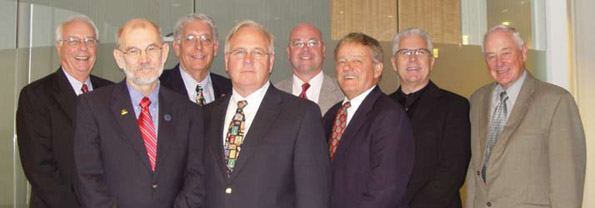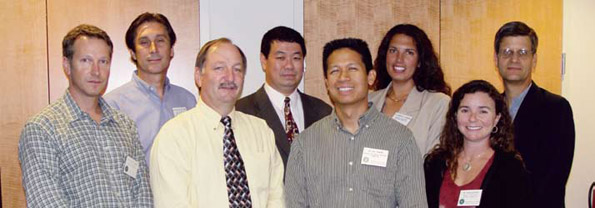Many faces, one profession
More than 400 positions exist on AVMA councils, committees, and task forces. To showcase the diverse backgrounds and expertise of the volunteers who serve on them and to inspire even more AVMA members to participate, JAVMA News will feature a few entities each month. To be a candidate for one of 78 current vacancies, click here, or contact officeevp avma [dot] org (officeevp[at]avma[dot]org).
avma [dot] org (officeevp[at]avma[dot]org).

AVMA State Advocacy Committee
Charge/mission: Oversee implementation of goals and objectives for AVMA's state legislative and regulatory policy efforts and monitor their effectiveness.
Members:
Dr. John Scamahorn (PUR '72), chair, Animal Medical Clinic PC, Greencastle, Ind., representing Executive Board
Dr. Ernest Godfrey (AUB '68), Pinellas Animal Hospital Bird Clinic Inc., Pinellas Park, Fla., representing Area 1 (Eastern states)
Dr. Tom Johnson (ISU '71), executive director of the Iowa VMA, representing Area 2 (Central states)
Dr. Jack Walther (CAL '63), part-time companion animal practitioner, Lamoille, Nev., representing Area 3 (Western states)
Ralph Johnson, executive director of the Colorado VMA, representing the American Society of Veterinary Medical Association Executives
Dr. Charles Helwig (KSU '66), retired clinic owner, Tucson, Ariz., at-large member
Dr. Gary Bullard (GA '69), Bullard Animal Hospital, Austell, Ga., chairman of the House Advisory Committee, representing the House of Delegates
Dr. Gerald Schmoling (MSU '83), business consultant, Tampa, Fla., representing the Legislative Advisory Committee
What current project(s) are you most excited about?
The Legal Outreach Program, currently in its developmental stage, intends to provide the veterinary perspective to the legal community on animal law issues, said Adrian Hochstadt, assistant director for state legislative and regulatory affairs in the AVMA Communications Division.
As a part of the program, veterinarians who have practiced in a clinical setting and attorneys familiar with this area present law students, practicing lawyers, and veterinary students with background information on the unintended consequences of awarding noneconomic damages, Hochstadt said.
A recent meaningful accomplishment:
We presented the 2006 State Public Policy Symposium and are in the process of planning the next symposium, scheduled for Nov. 7-8, 2009, in Tampa, Fla.
How is your entity addressing the profession's pressing issues and concerns of recent graduates?
In conjunction with the AVMA State Legislative and Regulatory Affairs Department in the Communications Division, the State Advocacy Committee assists state VMAs with lobbying and representing the profession's interests effectively in state capitals. The committee has established a liaison relationship with the Student AVMA Government Affairs Committee to promote the importance of advocacy with veterinary students.
How is the entity addressing the AVMA strategic and operational goals?
The AVMA has established advocacy as one of its five strategic goals to improve veterinary medicine at the state and federal level, Chair John Scamahorn said. The committee serves as a resource to guide the AVMA State Legislative and Regulatory Affairs Department. We provide advice and oversight on state and regulatory issues. The committee assists the department in identifying and prioritizing emerging issues that might challenge the profession at the state level.

AVMA Aquatic Veterinary Medicine Committee
Charge/mission: To advocate for and develop strategies to expand the discipline of aquatic veterinary medicine and veterinarian involvement in aquatic animal health and welfare, public and environmental health, and seafood safety, through legislative and regulatory input, education and training programs, and other needed resources.
Members:
Dr. Roy Yanong (UP '92), chair, Tropical Aquaculture Laboratory, University of Florida-Ruskin, representing research in aquatic animal health
Dr. Stephen Smith (OSU '86), vice chair, Department of Biomedical Sciences and Pathobiology, Virginia-Maryland Regional College of Veterinary Medicine, Blacksburg, Va., representing extension or diagnostic services
Andrew Goodwin, PhD, Aquaculture/Fisheries Center, University of Arkansas-Pine Bluff, representing nonveterinarian-aquaculture industry
Dr. Kathleen Hartman (VMR '99), USDA-APHIS Veterinary Services, Tropical Aquaculture Laboratory, University of Florida-Ruskin, representing public health or epidemiology
Dr. Lester Khoo (UP '90), Thad Cochran National Warmwater Center, Mississippi State University-Stoneville, representing private or public practice-food animal production
Dr. Jena Questen (COL '01), Centennial, Colo., representing private clinical practice-companion aquatic animal
Dr. Nicholas Saint-Erne (KSU '84), PetSmart Inc, Phoenix, representing industrial veterinary medicine
Dr. Jennifer Strasser (OKL '97), South Bend, Ind., representing state or federal regulatory veterinary medicine
Dr. Ernest Scott Weber (UP '97), Department of Medicine and Epidemiology, University of California-Davis School of Veterinary Medicine, representing academia
How is your committee addressing the AVMA strategic and operational goals?
Chair Roy Yanong said, "Aquatic veterinary medicine is a broad and expanding field within our discipline, with numerous issues paralleling those of more established terrestrial species, including domestic pets, farmed livestock, wildlife, and laboratory animals. The AqVMC is helping to promote this discipline, to fill a growing void, and to make aquatic veterinary medicine more mainstream for our profession and our stakeholders. For example, more veterinarians are needed to assist aquarium fish hobbyists, aquaculture, and relevant agencies, a fact made more urgent by new USDA aquatic animal disease regulations and changes in legal drug availability.
"Welfare issues for all aquatic species are coming to the fore. Promotion of aquatic veterinary education in schools and of nontraditional programs for continuing education is just one way we hope to begin addressing those needs."
What current project(s) are you most excited about?
Dr. David Scarfe, AqVMA staff consultant and assistant director of the AVMA Scientific Activities Division, said the committee is developing strategies for integrating aquatic veterinarians into commercial aquaculture, companion animal practices, academia, and federal and state agencies.
Online aquatic veterinarian and disease diagnostic directories (AquaVetMed.info) are being used worldwide, and AquaVetMed e-News informs of emerging issues.
AqVMC input and leadership on new online aquatic veterinary medicine modules support the revisions of the National Veterinary Accreditation Program.
How is your committee addressing the profession's pressing issues and concerns of recent graduates?
AqVMC is beginning to integrate the Executive Board-approved AVMA objectives into their strategies. The committee is now placing emphasis on strategies outlining educational and practice opportunities for veterinary students, new graduates, and experienced veterinarians, Dr. Scarfe said.